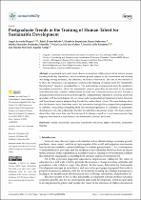Postgraduate Trends in the Training of Human Talent for Sustainable Development

View/
Author(s)
Acevedo-Duque, Ángel
Prado-Sabido, Tohtli
García-Salirrosas, Elizabeth Emperatriz
Fernández Mantilla, Mirtha Mercedes
Vera Calmet, Velia Graciela
Valle Palomino, Nicolás
Aguilar Armas, Haydee Mercedes
Date
2022-11Metadata
Show full item recordPublisher
MDPI
Abstract
A sustainable university must educate its academic collaborators and its interest groups, focusing on the key dimensions, such as economic growth, respect for the environment and carrying out energy saving measures, and efficiency and reuse of resources. The aim of this research is to show the tendencies of postgraduate courses in the training of human talent for “Sustainable
Development” based on grounded theory. The methodology is approached from the qualitative naturalistic perspective, where the hermeneutic analysis procedure is structured in five phases with data from nine countries obtained from 20 interviews conducted in the year 2021. For this, a dialogical intervention has been used through the complementary experiences of rectors, deans and specialists with doctoral degrees who are immersed in postgraduate programmes in Latin American and Spanish universities, safeguarding the identity under ethical criteria. The main findings show that this human capital that forms part of the universities through their postgraduate programmes is currently considering redesigning their educational programmes to contribute to sustainable development, not only academically but also through their educational model. The main evidence shows that today more than ever there is a need for change, a need for a new human resource that responds and aims for a triple balance: environmental, economic and social.
Type
info:eu-repo/semantics/bachelorThesis
Rights
info:eu-repo/semantics/openAccess
Language
eng

